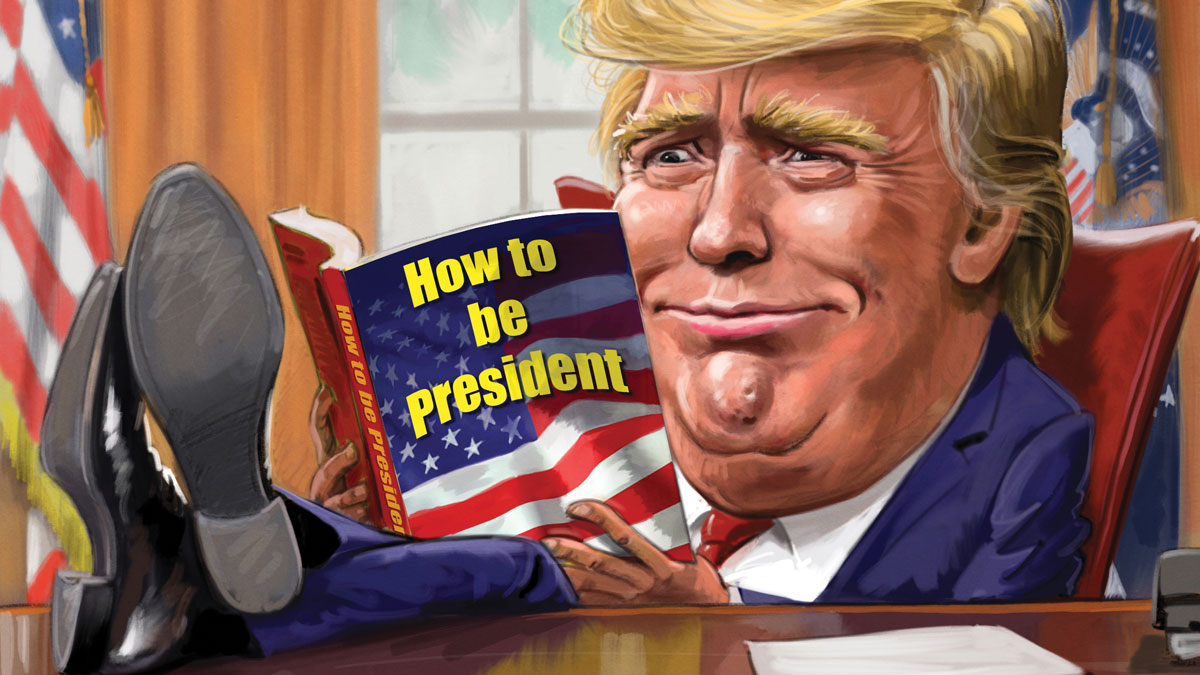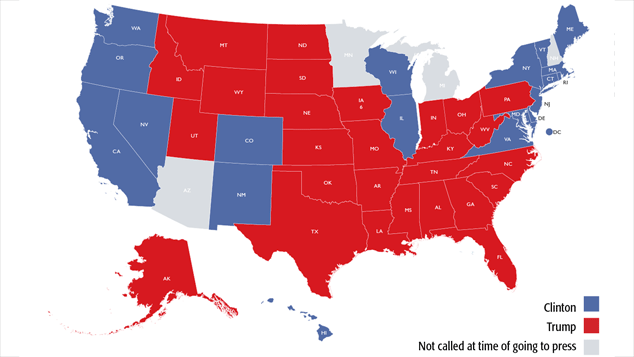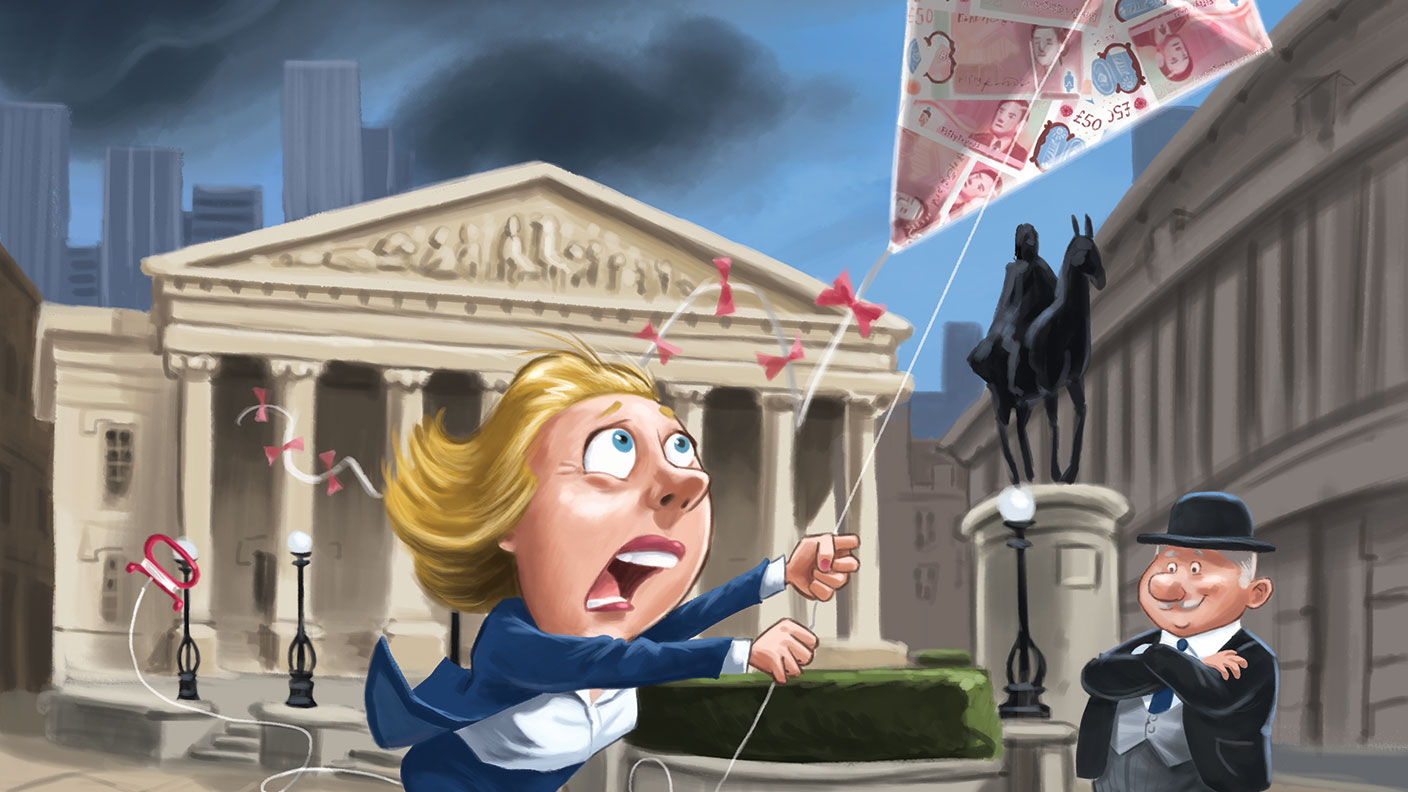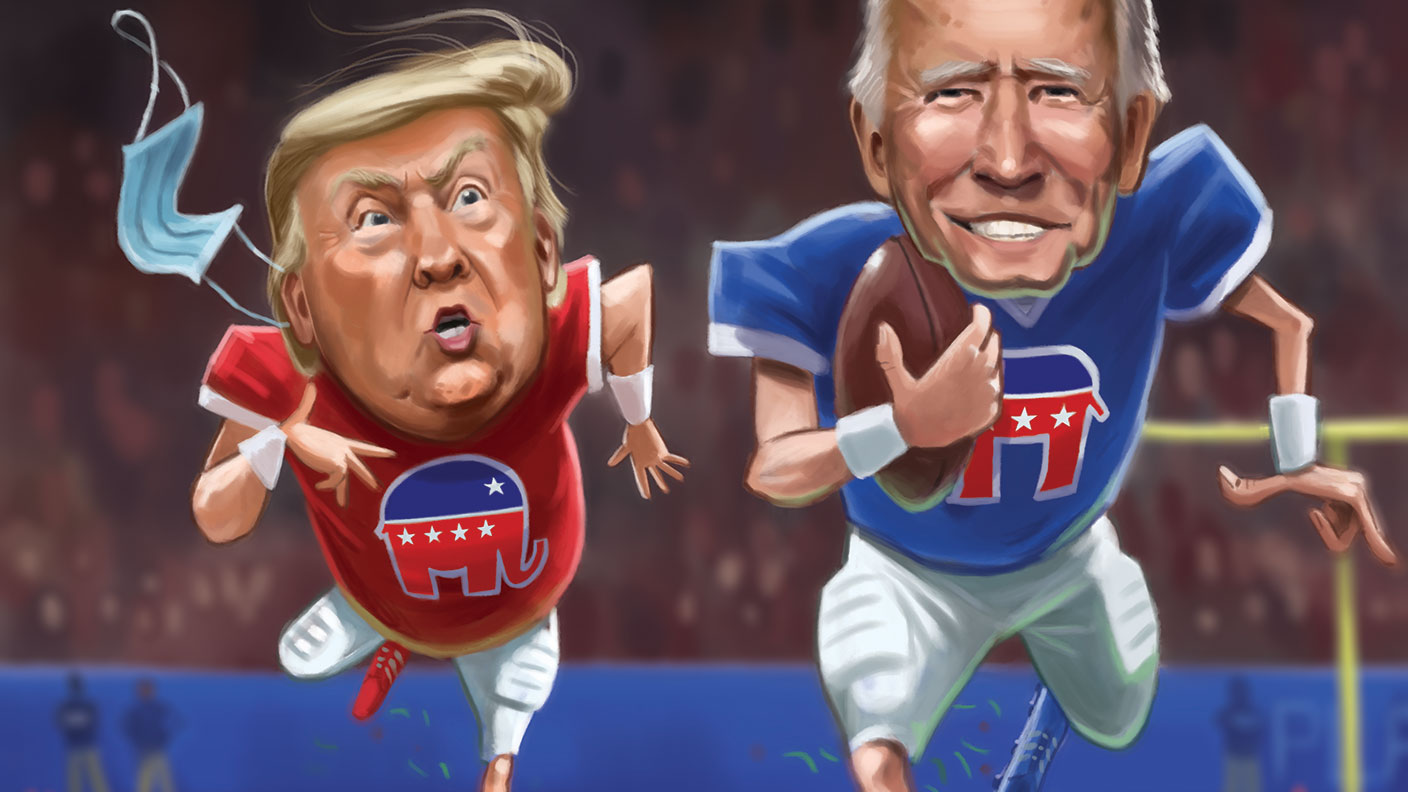What does the Trump win mean for your money?
With Trump in, deflation and the bond bull market are on their way out – expect inflation and turbulence and position your portfolio accordingly, say John Stepek and Matthew Partridge.

Get the latest financial news, insights and expert analysis from our award-winning MoneyWeek team, to help you understand what really matters when it comes to your finances.
You are now subscribed
Your newsletter sign-up was successful
Want to add more newsletters?

Twice daily
MoneyWeek
Get the latest financial news, insights and expert analysis from our award-winning MoneyWeek team, to help you understand what really matters when it comes to your finances.

Four times a week
Look After My Bills
Sign up to our free money-saving newsletter, filled with the latest news and expert advice to help you find the best tips and deals for managing your bills. Start saving today!

With Trump in, deflation and the bond bull market are on their way out expect inflation and turbulence and position your portfolio accordingly, say John Stepek and Matthew Partridge.
So much for the predictive power of markets. They didn't see Brexit coming. This week, they were blindsided by Donald Trump's election as US president. Yet overall bar a double-digit slide in the value of the Mexican peso against the dollar the reaction to Trump's victory was more muted than for Brexit.
As Paul Ashworth of Capital Economics notes, that's partly because Trump's conciliatory acceptance speech suggested he can be a more statesmanlike president than you would have thought from watching the demagogue of the election campaign. But it's also because the overall policy implications are not entirely clear as yet.
MoneyWeek
Subscribe to MoneyWeek today and get your first six magazine issues absolutely FREE

Sign up to Money Morning
Don't miss the latest investment and personal finances news, market analysis, plus money-saving tips with our free twice-daily newsletter
Don't miss the latest investment and personal finances news, market analysis, plus money-saving tips with our free twice-daily newsletter
Trump made plenty of aggressive noises during his campaign. On trade, he has vowed to scrap the Trans-Pacific Partnership trade deal between the US and Asia. More importantly, he wants unilaterally to withdraw from the North American Free Trade Agreement (Nafta), unless Mexico and Canada accept major changes. A trade war would hit all three countries hard 30% of US exports go to Nafta nations, while 75% of Canadian and Mexican exports go to their larger neighbour (hence the slide in the Mexican peso).
The talks would be complicated somewhat by Trump's pre-election demand that Mexico pay for a wall across the US-Mexico border, to keep out illegal immigrants. Trump has also dubbed China a "currency manipulator", with the aim of getting Beijing to revalue the yuan higher, making US exports more competitive. China is hardly likely to acquiesce, which could end up in another trade war, with Trump promising to levy tariffs on Chinese goods.
However, will he act on any of these promises? Trump is clearly not averse to lying to please an audience. Equally, as Derry Pickford of Ashburton Investments points out, while the Republicans will control Congress, it doesn't mean that Trump will get a free pass, particularly on his more extreme ideas. He "is likely to face resistance from his own party and is unlikely to get cooperation from the Democrats after a bitter and acrimonious election". So for now we can't be sure how Trump the campaigner will compare with Trump the president.
Inflation is coming
However, on a longer-term basis, we can draw a few conclusions and one is that Trump's victory marks the end of an era. Forget the "new normal" of deflation and an inexorable slide towards negative interest rates. A Trump presidency is an inflationary one. That might not be clear yet. The markets feel nervous. Trump is an unknown quantity, and uncertainty can hold people back from making investment decisions and from borrowing money. That's disinflationary. But it's about the only thing about Trump that is disinflationary.
Overall, his policies even if he doesn't manage to push them all through in their most extreme forms are very inflationary, and if this was any other candidate the market would already be recognising that.
Trump wants to reduce the top rate of income tax, and to ensure that no American business pays more than 15% of its profits in tax, compared with a maximum of 35% now. These proposed tax cuts are worth around $6trn over the next decade, says Ashworth. That's inflationary it puts money in the pockets of consumers and companies today, which will increase demand. He wants to increase infrastructure spending by $1trn over the next ten years. That's inflationary too.
While he might not embark on a full-blown trade war, he clearly wants increased protectionism one way or another that's inflationary too. And concerns over the precise consequences of his foreign policy, particularly his ambivalence towards Nato, will also be inflationary unfortunately, defence spending and a generally higher level of readiness for war in the world tends to be inflationary too.
Trump has also set himself up for a tough relationship with the Federal Reserve by heavily criticising the chair Janet Yellen and her zero-interest-rate policies. Some analysts suggest that a Fed interest-rate rise next month is less likely now that Trump has won, but we wouldn't be so sure. Even if Trump is bad for the economy, the data won't show that immediately.
So if rates stay on hold in December, the Fed is effectively arguing that America's choice of president has been a bad one for financial stability. That's a pretty bald political statement for a neutral central bank to make. Also, given Trump's hostility, Yellen might feel more comfortable about hiking rates in any case, regardless of concerns about triggering a recession.
Given that the threat of both rising prices and rising interest rates there's a strong possibility that 2016 marks the end of the long bond bull market that started way back in the early 1980s. Fittingly, that was when Margaret Thatcher and Ronald Reagan two of the most radical politicians of their time laid the foundations for the era of globalisation and financialisation that was dealt a mortal blow in 2008, and is now choking out its last gasp.

You ain't seen nothing yet
If the bond market really has topped out, it would be a major event for markets. Yet the biggest political shock may be yet to come. As my colleagueDan Denning pointed out in MoneyWeek last month, Trump is far from the only populist in town. If you want to know where the next major crisis is coming from, look no further than France. A victory for Marine Le Pen of the Front National in the second round of the French presidential election next May could be even bigger than Trump or Brexit.
Brexit means Britain renegotiating its terms of trade and border policy with Europe. The US has now decided to renegotiate its terms of trade and border policies with the whole world. But if France votes for Le Pen, it will mean that one of the primary architects of the European project has decided to reject the EU and the euro. That would very likely mean the disintegration of the euro, a major global reserve currency, second only to the dollar.
It is no exaggeration to say that this could conceivably lead to the collapse of the European banking system and a global financial panic that with central bankers' hands rather tied could outstrip the chaos we saw in 2008. The Italian constitutional referendum next month might give us a hint of the chaos to come in Europe, but the French election is the one to watch.In short, Trump doesn't mark "peak populism" not by a long chalk. We look at how to invest for this brave new world in the box below.
The five stocks to buy now
In terms of specific sectors, healthcare and biotech have enjoyed a strong relief rally as the prospect of a crackdown on rising drug prices (a likelihood under Hillary Clinton) has receded. A simple way to invest in biotech and health care is via the Biotech Growth Trust (LSE: BIOG), or the Worldwide Healthcare Trust (LSE: WWH), both of which are currently on discounts of around 1%. Defence stocks are also doing well. Both Clinton and Trump would have buoyed defence spending and the added uncertainties over Trump's precise foreign policy only adds to the case for increased global defence budgets we'll have more on this next issue. Airbus Group (Paris: EAD) should benefit from any European rearmament and trades on 14.3 times 2017 earnings.
Elsewhere, the share prices of coal producers have enjoyed a massive rebound this year as the price of the commodity rallied with most other raw materials. That is likely to continue with Trump's more fossil-fuel-friendly policies in place. One interesting way to play the rebound is via a US-listed coal producer such as Consol Energy (NYSE: CNX) Consol also produces natural gas, which is one reason it has survived what has otherwise been a brutal decade for the coal sector.
Remain diversified, of course. US equities still look pricey and we'd be wary of Mexico too until the outlook is clearer. But owning Japan, the eurozone and emerging markets more generally gives you a good spread of exposure. And stick with gold it's a good way to insure your portfolio against the unexpected, and as such, it has rebounded with Trump's victory. You can invest via an online service such as BullionVault.com, or via an exchange-traded fund such as ETFS Physical Gold (LSE: PHAU).
Get the latest financial news, insights and expert analysis from our award-winning MoneyWeek team, to help you understand what really matters when it comes to your finances.

-
 How to navigate the inheritance tax paperwork maze in nine clear steps
How to navigate the inheritance tax paperwork maze in nine clear stepsFamilies who cope best with inheritance tax (IHT) paperwork are those who plan ahead, say experts. We look at all documents you need to gather, regardless of whether you have an IHT bill to pay.
-
 Should you get financial advice when organising care for an elderly relative?
Should you get financial advice when organising care for an elderly relative?A tiny proportion of over 45s get help planning elderly relatives’ care – but is financial advice worth the cost?
-
 Governments will sink in a world drowning in debt
Governments will sink in a world drowning in debtCover Story Rising interest rates and soaring inflation will leave many governments with unsustainable debts. Get set for a wave of sovereign defaults, says Jonathan Compton.
-
 Why Australia’s luck is set to run out
Why Australia’s luck is set to run outCover Story A low-quality election campaign in Australia has produced a government with no clear strategy. That’s bad news in an increasingly difficult geopolitical environment, says Philip Pilkington
-
 Why new technology is the future of the construction industry
Why new technology is the future of the construction industryCover Story The construction industry faces many challenges. New technologies from augmented reality and digitisation to exoskeletons and robotics can help solve them. Matthew Partridge reports.
-
 UBI which was once unthinkable is being rolled out around the world. What's going on?
UBI which was once unthinkable is being rolled out around the world. What's going on?Cover Story Universal basic income, the idea that everyone should be paid a liveable income by the state, no strings attached, was once for the birds. Now it seems it’s on the brink of being rolled out, says Stuart Watkins.
-
 Inflation is here to stay: it’s time to protect your portfolio
Inflation is here to stay: it’s time to protect your portfolioCover Story Unlike in 2008, widespread money printing and government spending are pushing up prices. Central banks can’t raise interest rates because the world can’t afford it, says John Stepek. Here’s what happens next
-
 Will Biden’s stimulus package fuel global inflation – and how can you protect your wealth?
Will Biden’s stimulus package fuel global inflation – and how can you protect your wealth?Cover Story Joe Biden’s latest stimulus package threatens to fuel inflation around the globe. What should investors do?
-
 What the race for the White House means for your money
What the race for the White House means for your moneyCover Story American voters are about to decide whether Donald Trump or Joe Biden will take the oath of office on 20 January. Matthew Partridge explains how various election scenarios could affect your portfolio.
-
 What’s worse: monopoly power or government intervention?
What’s worse: monopoly power or government intervention?Cover Story Politicians of all stripes increasingly agree with Karl Marx on one point – that monopolies are an inevitable consequence of free-market capitalism, and must be broken up. Are they right? Stuart Watkins isn’t so sure.